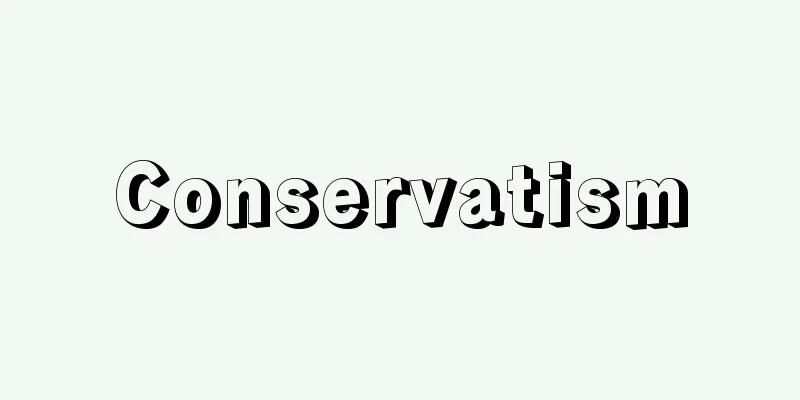Conservatism

|
The term conservatism can be broadly divided into two usages. The first refers to a conservative political ideology, and it is said that it was first used in 1818 when Chateaubriand, a Frenchman, named his magazine "The Conservative". The term became common in this sense, first in England in 1835, and then in European countries from the mid-19th century onwards, against the backdrop of the establishment of political parties calling themselves conservative. The second usage of conservatism does not only refer to politics, but also to a general attitude of maintaining the status quo in relation to progressivism in any matter. In this case, it is a concept that indicates the psychological characteristics of individuals or groups, such as fear of the unknown and adherence to habits inherited from the past, both of which are rooted in an instinctive desire for security. Conservatism in this sense does not necessarily correspond to it as a political ideology, and it is a fact that is often observed that people who are psychologically conservative support progressive ideologies in politics, and vice versa. However, in everyday usage, this second sense of conservatism is not the primary usage of the word conservatism, although it does exist as the central meaning of the adjective "conservative." The original usage of conservatism, as its origins indicate, is that of a political ideology. Conservatism as a political ideology is characterized by the fact that it has never been formulated as a universal theory that concerns humanity in general, unlike, for example, human rights ideas or socialism. Moreover, the specific details of the ideology vary because the content of the status quo that should be maintained is not the same from place to place and time. However, in the 1830s, British Prime Ministers Peel and Disraeli (both of whom were prime ministers) who were close to the origin of the term, argued that a harmonious ideal society would be one in which the aristocracy under the monarchy was the leading class in society while promoting the welfare of the people, and that this had already basically been realized in Britain. This argument was a rejection reaction by the traditional ruling class against the rule of industrial capitalism and its ideological liberalism, but in terms of its criticism of the inhumanity of the new industrial society, it was a twin brother of nascent socialism, even though the image of the ideal society they aimed for was opposite. In fact, the social classes that supported both groups were often the same, such as aristocrats, peasants, and unskilled workers. The circumstances surrounding conservatism as a political ideology were the same in France and Germany, and a certain degree of commonality in theory emerged between the two countries, but the origins of this commonality go back even further, to the reaction of the aristocracy of each country to the French Revolution. The first theorist to do so, the British Edmund Burke, wrote a book criticizing the revolution, Reflections on the Revolution in France (1790), which was translated into many languages and was considered the holy book of conservatism at least until the mid-19th century. Burke criticized the essence of the revolution as being in the "shameless pure democracy" that the money-owning class had created by inciting the lower classes with the use of Enlightenment ideas, which were nothing more than abstract speculation, in order to expand their own interests. He argued, on the other hand, that the harmony of all the contradictions in human society, and all virtue and perfection, had already been realized in traditional English society. However, at the bottom of Burke's intense ideological attitude was a deep skepticism about human progress through reason, and a pessimistic view of humanity, believing that humans, if left to their own devices, would run wild in an endless stream of disorder. The term "conservatism" did not exist in Burke's time, so Burke did not call himself a conservative. However, conservatism after Chateaubriand came to owe a great deal to Burke, including its view of humanity. Since the mid-19th century, when the collapse of traditional agricultural society and aristocratic rule became evident, conservatism in various countries began to clearly put anti-socialist positions at the forefront, as it became the ideology of the new bourgeois ruling class to maintain the status quo. In order to oppose socialist internationalism, nationalism was advocated and imperialist policies were supported. Today's conservatism is sometimes called neoconservatism in the United States and elsewhere, but what is common to all countries is the defense of capitalism and anti-communism. However, its supporters appear to be much more diverse than before. Conservatism often tries to realistically accept inevitable change, and in this respect it is conceptually distinct from reactionism, which also seeks utopia in the past but stubbornly seeks its realization without compromise, and in fact conservatives and reactionaries often differ quite a bit in terms of personality, but it is not easy to distinguish between the two on the basis of ideology. In Japan, the phrase "conservative reaction" has been used to refer to both since the 1890s, and it is not without reason that in France they are often both commonly referred to as traditionalism. [Takamaro Hanzawa] "Historicism and Conservatism" by K. Mannheim, translated by Hiroshi Mori (1969, Koseisha Koseisha) "What is Conservatism?" by H. Cecil, translated by Takuhiro Sakata (1979, Waseda University Press) Source: Shogakukan Encyclopedia Nipponica About Encyclopedia Nipponica Information | Legend |
|
保守主義ということばには大きく分けて二つの用語法がある。その第一は、保守的な政治的イデオロギーをさすもので、その最初の使用は、1818年フランスのシャトーブリアンが自分の雑誌に『保守主義者』と命名したこととされている。その後まずイギリスで1835年、ついで19世紀なかば以降ヨーロッパ各国における保守を名のる政党の成立が背景となって、この意味での保守主義ということばが一般化した。保守主義の第二の用語法は、単に政治にとどまらず、事柄はなんであれ、進歩主義に対して、現状維持的態度一般をさすもので、この場合、未知への恐怖心、過去から受け継いだ習慣への固執といった、いずれも安全への本能的欲求に根ざした、個人または集団の心理的特性を表示する概念である。この意味での保守主義は、政治的イデオロギーとしてのそれとはかならずしも必然的な対応関係はなく、心理的に保守的傾向の強い人物が、政治的には革新的イデオロギーを支持したり、またその逆もあることは、しばしば観察される事実である。しかし、日常の用語法では、この第二の意味の保守主義は、一般に「保守的」という形容詞の中心の意味として存在はしているが、それが保守主義ということばの主たる用語法ではない。保守主義の本来の用語法は、その発生源が示すとおり、政治的イデオロギーとしてのそれである。 政治的イデオロギーの保守主義の特徴は、たとえば人権思想や社会主義などとは異なって、人間一般にかかわる普遍的理論として定式化されたことがないことである。しかも、維持されるべき現状の内容が時と所によって同じではないから思想の具体的細目はさまざまである。しかし、このことばの発生源に近い1830年代のイギリスのピールやディズレーリ(いずれも首相)においては、君主政の下にある貴族を社会の指導階層としながら民衆の福祉を増進する社会こそ調和的理想社会とされ、しかもイギリスでそれは基本的にはすでに実現されていると主張された。この主張は、産業資本主義の支配とそのイデオロギーとしての自由主義に対する伝統的支配層の拒否反応であったが、新しい産業社会の非人間性に対する批判という点では、目ざす理想社会のイメージは反対であっても、発生期の社会主義とは双子の兄弟であった。事実、両者の支持者の社会層は貴族、農民、非熟練労働者など、同じであることが多かった。 政治的イデオロギーとしての保守主義をめぐるこうした事情は、フランスやドイツでも同じであり、そこに、ある程度理論の共通性も生まれたが、そうした共通性の起源は、さらにさかのぼって、フランス革命に対する各国貴族の反応にある。その最初の理論家、イギリスのエドマンド・バークの革命批判の書『フランス革命の省察』(1790)は、各国語に翻訳され、少なくとも19世紀中期までは保守主義の聖典とされた。バークは、革命の本質を、貨幣所有階級が自己利益拡大のため、抽象的思弁にすぎない啓蒙(けいもう)思想を武器とし、下層大衆を扇動してつくりだしている「恥知らずの純粋民主政」にあるとして非難し、それに対して、イギリスの伝統社会には、人間社会のあらゆる矛盾の調和、あらゆる徳と完成がすでに実現していると論じた。しかし、バークのこうした激しいイデオロギー的態度の底には、同時に、理性による人間の進歩に対する深い懐疑、人間は放置されれば止めどもなく無秩序に走るものであるという悲観的人間観があった。バークの時代には保守主義ということばはまだなかったから、バークは保守主義者とは自称していない。しかし、シャトーブリアン以後の保守主義は、人間観までも含めてバークに多くを負うこととなった。 農業中心の伝統社会と貴族支配の崩壊がもはや明らかとなった19世紀中期以降の各国の保守主義は、それが新しいブルジョア支配層の現状維持のイデオロギーとなったことからして、はっきり反社会主義の主張を前面に押し出すようになった。社会主義のインターナショナリズムに反対するためにも、ナショナリズムが主張され、帝国主義政策が支持された。今日の保守主義は、アメリカその他で新保守主義とよばれることもあるが、各国に共通なのは資本主義擁護と反共主義である。しかし、その支持層は以前よりもはるかに多様化しているとみられる。 なお、保守主義は、不可避的な変化は現実的に認めていこうとすることが多く、この点で、同じく過去にユートピアを求めながら、妥協を排してかたくなにその実現を求める反動主義とは概念上区別されるし、実際、保守主義者と反動主義者とは性格類型としてかなり異なることが多いが、両者をイデオロギーによって区別するのは容易でない。日本では両者を一括した「保守反動」という成句が1890年代からあり、またフランスでは両者が共通に伝統主義とよばれることが多いのも、理由のないことではない。 [半澤孝麿] 『K・マンハイム著、森博訳『歴史主義・保守主義』(1969・恒星社厚生閣)』▽『H・セシル著、栄田卓弘訳『保守主義とは何か』(1979・早稲田大学出版部)』 出典 小学館 日本大百科全書(ニッポニカ)日本大百科全書(ニッポニカ)について 情報 | 凡例 |
<<: Bojutsu Reform - Bojutsu Reform
Recommend
Toilet - benjo
A building or facility within a building that is ...
All Japan Student Federation - Zengakuren
Abbreviation for All Japan Student Self-Governmen...
Jabal al-Shaykh
…It is 2,814 meters above sea level. In Arabic, i...
Discography
Discography is a collection and organization of da...
Iebori
A general term for small items made by the Goto fa...
Böckmann, W.
…First, he invited foreigners employed by the gov...
SIDEMAR
...Factories of local production from Japan, such...
Kaigre - Kaigre
...A warm-water fish (illustration) of the family...
Robbery - Gotouzai
This is a crime of taking property from another p...
Willaby, F. - Willaby
…Influenced by his mother who knew about herbs, R...
Oguchiya Gyouu - Oguchiya Gyouu
…First performed at the Tokyo Kabukiza in April 1...
Chromium oxide
Compounds of chromium and oxygen. Different oxide...
Nippara Limestone Cave - Nippara Limestone Cave
This limestone cave is located in the Ogawadani v...
Micro‐whip‐scorpion (paper-twisting worm)
A small arthropod belonging to the order Palpigrad...
Marmot - Marmot (English spelling)
A general term for animals in the genus Marmot, o...









